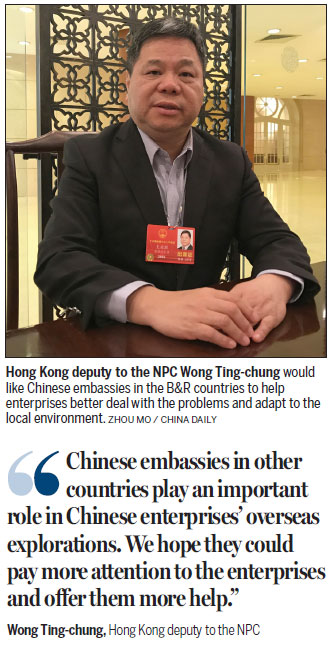Chinese missions urged to help B&R enterprises
Updated: 2018-03-14 06:52
By Zhou Mo in Beijing(HK Edition)
|
|||||||
Hong Kong deputies to the National People's Congress - the country's top legislature - have called on Chinese embassies to play a bigger role in helping Chinese enterprises develop their businesses in countries involved in the Belt and Road Initiative.
With rising production and labor costs in Guangdong province, previously known as "the world's factory", more and more Hong Kong enterprises in the traditional manufacturing industry, which used to set up factories on the mainland decades ago, are moving their production base overseas, especially in countries and regions engaged in the B&R vision, taking advantage of their lower operational costs.
"However, with little knowledge and experience, exploration in those countries is hard," said Wong Ting-chung, a Hong Kong deputy to the NPC, who is also chairman and chief executive officer of knitwear manufacturer Nameson Group.
Wong recalled making his first move back in 2013 when he set up a plant in Vietnam's Ho Chi Minh City. The plant came into operation in late 2014. He then further expanded his company's presence in the B&R countries by launching another factory in Myanmar in 2015.

"We faced a number of difficulties at the time. For example, we could not understand their languages. We didn't know their laws. Their taxation systems are different. And, our living habits are different from those of the local people," Wong told China Daily in an interview on the sidelines of the annual two sessions in Beijing.
"What we could do was to learn and strive to adapt to the environment ourselves."
He suggested that Chinese embassies in the B&R countries could help enterprises better deal with the problems and adapt to the local environment faster.
"Chinese embassies in other countries play an important role in Chinese enterprises' overseas explorations. We hope they could pay more attention to the enterprises and offer them more help."
Pauline Ngan Po-ling, another NPC deputy from Hong Kong, highlighted the importance of overseas Chinese in linking Chinese enterprises with the B&R countries.
Ngan, who is also deputy chair and managing director of headwear manufacturer Mainland Headwear, moved 65 percent of her company's labor-intensive operations from Shenzhen to Bangladesh several years ago.
"About 60 million overseas Chinese live in countries involved in the initiative. They have knowledge of the condition and culture of their home country. At the same time, they know the economic situation and local customs of their host country," Ngan said, calling them "a natural bridge and bond".
In this sense, Chinese embassies could do more to encourage and guide overseas Chinese in participating in the B&R Initiative so that they can give full play to their advantages, she said.
Ngan also urged the central government to work more closely with the governments in the B&R nations, and encourage them to offer preferential policies to attract more Chinese small- and medium-sized enterprises to invest there.
The B&R Initiative, which was mooted by President Xi Jinping in late 2013, aims to build trade and infrastructure networks linking Asia with Europe and Africa and promoting international cooperation. More than 60 countries and regions, with populations accounting for 60 percent of the world's total, are involved.
sally@chinadailyhk.com
(HK Edition 03/14/2018 page6)